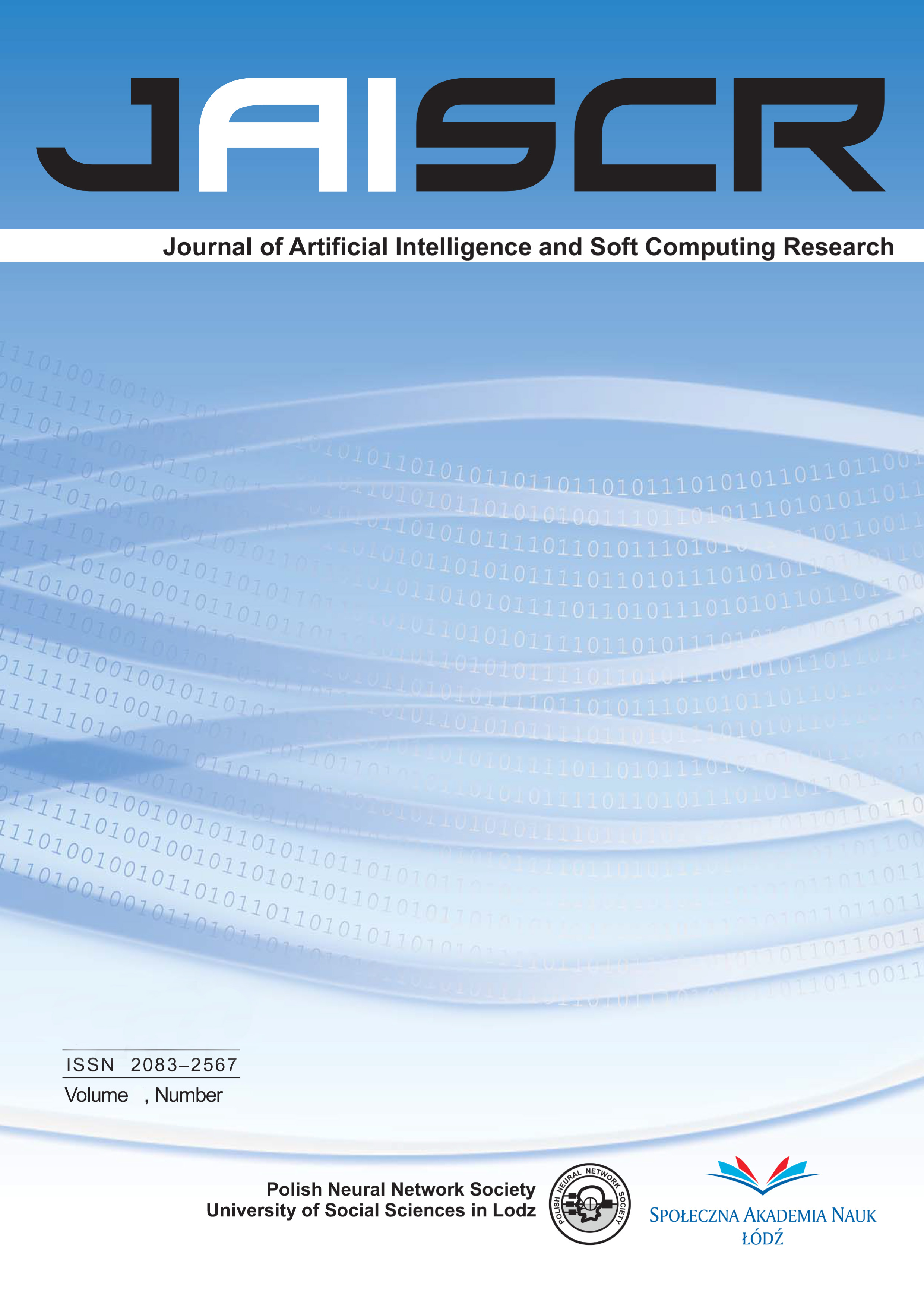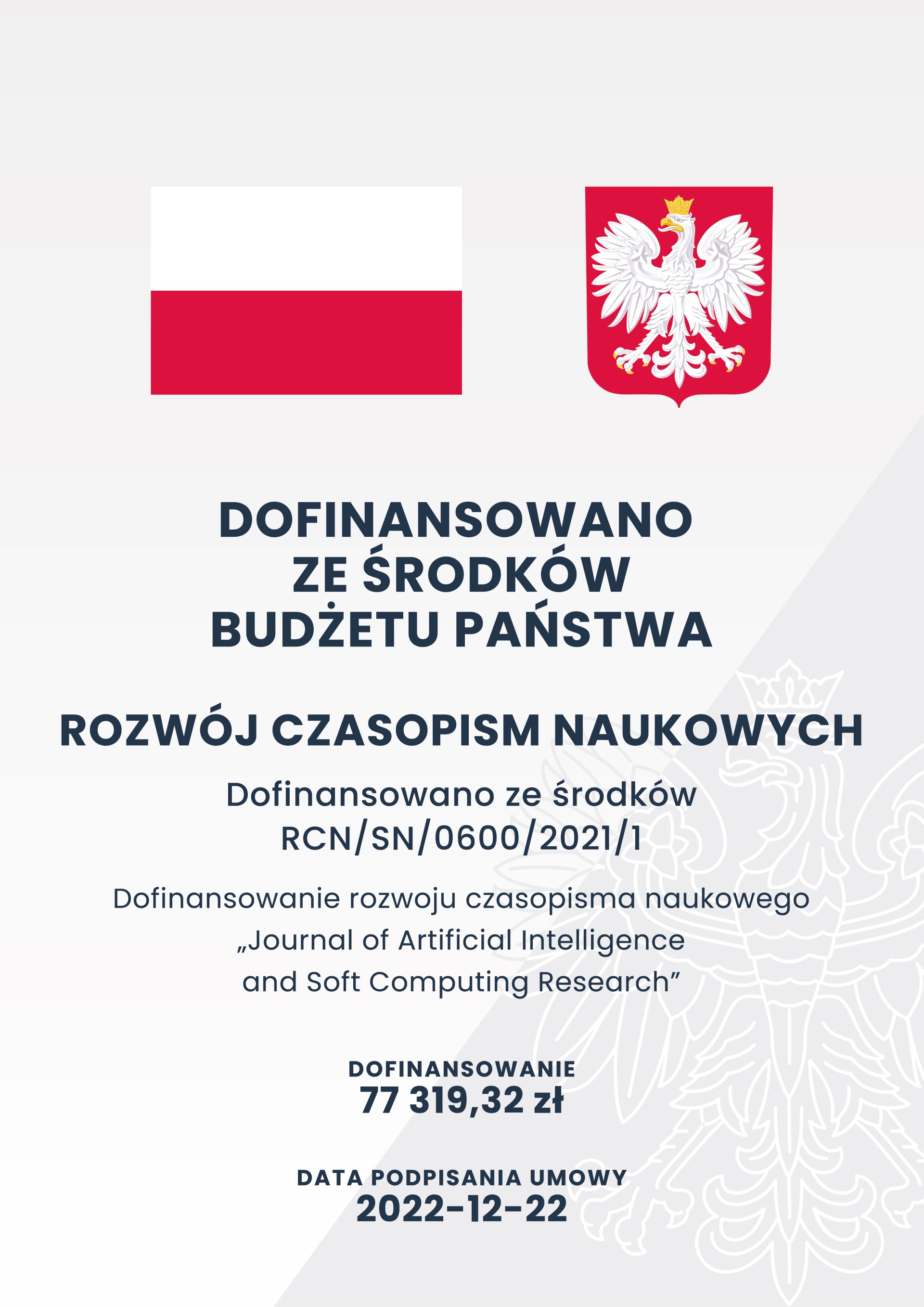Instructions for Authors
Authors who would like to publish their articles in JAISCR, should read all necessary information placed below and follow them.
The journal publishes articles that have been accepted following peer review.
JAISCR publishes articles based upon original research that are judged, after editorial review, to make novel and important contributions to both theory and applications of artificial intelligence and soft computing.
Copyright
All the authors retain copyright. The author grants De Gruyter only the exclusive license for commercial use of the article, by signing the License to Publish. Scanned signed copy of the license should be submitted with the paper (in the same zip file) or sent to the journal e-mail (jaiscr.journal@gmail.com), during the submission process.
Scientific Misconduct and Other Fraud
Scientific misconduct is defined by the editorial board as „fabrication, falsification, plagiarism, or other practices that seriously deviate from those that are commonly accepted within the academic community for proposing, conducting, or reporting research”. In cases where there is a suspicion or allegation of scientific misconduct or fraudulent research in articles submitted or published, the editors reserve the right to put sanctions on the authors, such as:
- an immediate rejection of the article,
- banning author(s) from submitting articles to the journal for a certain period of time,
- retracting the article.
Plagiarism
As a member of CrossCheck, De Gruyter provides plagiarism detection software to all its journals. When plagiarism in the submitted article is identified, editors will follow international, standard guidelines on plagiarism
Retraction Policy
Serious errors in a published articles and infringements of professional ethical codes will result in an article being retracted. This will occur when the article is clearly defamatory, or infringes others’ legal rights, or when the article is, or there is good reason to expect it will be, the subject of a court order. In any of these cases all coauthors will be informed about a retraction.
Conflict of Interest
In order to encourage transparency without impeding publication, all authors, referees and editors must declare any association that poses a conflict of interest in connection with the article. There should be no contractual relations or proprietary considerations that would affect the publication of information contained in a submitted article. A competing interest for JAISCR is anything that interferes with, or could reasonably be perceived as interfering with, the full and objective presentation, review, or publication of research findings, or of articles that comment on or review research findings. Potential conflicts of interest exist when an author, editor or reviewer has financial, personal or professional interests in a publication that might influence their scientific judgment. Examples of such conflicts include, but are not limited to:
- Financial conflicts: stock ownership; patents; paid employment or consultancy; board membership; research grants; travel grants and honoraria for speaking or participation at meetings; gifts,
- Personal conflicts: relationship with editors, editorial board members, or with possible reviewers who have had recent or ongoing collaborations with the authors, have commented on drafts of the manuscript, are in direct competition, have a history of dispute with the authors,
- Professional conflicts: public associations with institutions or corporations whose products or services are related to the subject matter of the article; membership of a government advisory council/committee; relationship with organizations and funding bodies.
Editors should consider whether any of the above competing interests are relevant to them and the manuscript under consideration. Editor who believes that the conflict will preclude an impaired judgment should disclose to the Editor-in-Chief the nature of the conflict and decline to handle an article.
Reviewers should consider whether any of the above applies to them and declare any such competing interests. If they feel they cannot review an article because of any competing interest, they should tell us. They should also declare any association with the authors of an article. The content of the published manuscript, as read and approved by the authors after editing and as proofread by the authors after it is typeset, is the responsibility of the authors.
Authorship
The authorship of the work should fullfill the following four criteria:
- Substantial contributions to the conception or design of the work; or the acquisition, analysis, or interpretation of data for the work.
- Drafting the work or revising it critically for important intellectual content.
- Final approval of the version to be published.
- Agreement to be accountable for all aspects of the work in ensuring that questions related to the accuracy or integrity of any part of the work are appropriately investigated and resolved.
Ghostwriting and Guest Authorship
It is one of editors duties to prevent ghost-writing, guest authorship and honorary authorship. These apply mainly to texts that are co-written by multiple authors. When submitting articles for publication in JAISCR authors may be asked to reveal how much each of the authors has contributed to the creation of the text in question and how. Each and any discovered instance of ghost-writing, guest authorship and honorary authorship will be revealed and authors engaging in such practice will be subject to the above mentioned sanctions.
That is why JAISCR added a relevant section in the License to Publish that is be signed before submission of each article.
Manuscript genuineness
Submission of a manuscript implies: that the work described has not been published before; that it is not under consideration for publication anywhere else; that its publication has been approved by all co-authors, if any, as well as by the responsible authorities - tacitly or explicitly - at the institute where the work has been carried out. The publisher will not be held legally responsible should there be any claims for compensation.
Permissions
Authors wishing to include figures, tables, or text passages that have already been published elsewhere are required to obtain permission from the copyright owner(s) for both the print and online format and to include evidence that such permission has been granted when submitting their papers. Any material received without such evidence will be assumed to originate from the authors.
Overlapping Publications
If a submission overlaps significantly with one or more refereed or copyrighted publications by the authors then the authors must disclose this to the handling editor-in-chief at the time of submission. Their submission must cite those publications and explain their relationship to the submission. Similarly, the authors must immediately notify an Editor-in-Chief if they submit an overlapping paper for publication in a refereed or copyrighted outlet while their JAISCR submission is being considered.
A submission that substantially overlaps the authors' previous refereed or copyrighted publications, such as an extended version of a conference paper, must contain at least 30% significant new content. Such a submission must be accompanied by a separate detailed explanation to the reviewers and the handling Editor-in-Chief of this additional content. Deciding whether the additions are significant enough to warrant publication is inevitably a judgment call of the reviewers and editor.
Removing/Adding an Author
The authors’ request for addition or removal of an author should be properly justified. Please note that a change in authorship (order of listing, addition or deletion of a name, or corresponding author designation) after submission of the manuscript will be implemented only after receipt of signed statements of agreement from all parties involved (all listed authors and the author to be removed or added).
If a submission is based on one or more papers previously submitted (but rejected) elsewhere, we encourage the authors to carefully handle any review comments received on the earlier versions of their articles before submission to the journal. This indicates a commitment to achieving the best possible results and shows respect for the reviewing system. If it is discovered that earlier comments are not handled, this is likely to adversely affect the evaluation of a manuscript and may be a reason for rejection.
Article format
Title Page
The title page should include:
- The name(s) of the author(s)
- A concise and informative title
- The affiliation(s) and address(es) of the author(s)
- The e-mail address, telephone and fax numbers of the corresponding author
Abstract
Please provide an abstract up to 200 words. The abstract should not contain any undefined abbreviations or unspecified references.
Keywords
Please provide 4 to 6 keywords which can be used for indexing purposes. Author affiliations are not permitted to contain parenthetical matter.
Headings
Please use no more than three levels.
Abbreviations
Abbreviations should be defined at first mention and used consistently thereafter.
Footnotes
Footnotes can be used to give additional information, which may include the citation of a reference included in the reference list. They should not consist solely of a reference citation, and they should never include the bibliographic details of a reference. They should also not contain any figures or tables. Footnotes to the text are numbered consecutively; those to tables should be indicated by superscript lower-case letters (or asterisks for significance values and other statistical data). Footnotes to the title or the authors of the article are not given reference symbols. Always use footnotes instead of endnotes.
Acknowledgments
Acknowledgments of people, grants, funds, etc. should be placed in a separate section before the reference list. The names of funding organizations should be written in full.
References
Citation
Reference citations in the text should be identified by numbers in square brackets. Some examples:
- Learning algorithms affects many systems [3].
- This result was later proved by Smith [5].
- This algorithm has been widely studied [1-3, 7].
Reference list
The list of references should only include works that are cited in the text and that have been published or accepted for publication. Personal communications and unpublished works should only be mentioned in the text. Do not use footnotes or endnotes as a substitute for a reference list.
The entries in the list should be numbered consecutively.
- Journal article
- Article by DOI
- Book
- Book chapter
- Online document
Tables
- All tables are to be numbered using Arabic numerals.
- Tables should always be cited in text in consecutive numerical order.
- For each table, please supply a table caption (title) explaining the components of the table.
- Identify any previously published material by giving the original source in the form of a reference at the end of the table caption.
- Footnotes to tables should be indicated by superscript lower-case letters (or asterisks for significance values and other statistical data) and included beneath the table body.
Review process
If a manuscript is believed to not meet the standards of the journal or is otherwise lacking in scientific rigor or contains major deficiencies, the reviewers will attempt to provide constructive criticism to assist the authors in ultimately improving their work. If a manuscript is believed to be potentially acceptable for publication but needs to be improved, it is invited for reconsideration with the expectation that the authors will fully address the reviewers' suggestions.
When the review process is finished, a decision letter will be sent to the authors, including the comments of the referee(s). Any corrections suggested by the reviewers, should be made within the period of time indicated in the letter. All of the comments raised by the referees should be addressed and point by point responses (as specific as possible) should be provided in a separate document. If the paper is accepted after major revisions, it will be submitted again for peer review to the same evaluators.
After a second review of the corrected manuscript, a final decision letter concerning publication is sent to the authors.
For enquiries relating to the submission of articles (including electronic submission where available) please visit this journal's homepage at http://jaiscr.online/
Contact details for questions arising after acceptance of an article, especially those relating to proofs, are provided when an article is accepted for publication.
To submit and track your manuscript, please go to the online submission system: https://www.editorialsystem.com/jaiscr/




